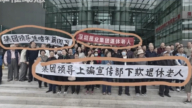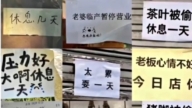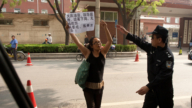【新唐人2012年7月16日讯】中国大陆大批维稳人员殴打、拦截上访民众,已经成为北京和各省省会天天发生的事情。大陆经济学家指出,当局镇压访民的花销是个无底洞。而有访民向本台记者证实,他们也为申冤花钱无数。日前,浙江杭州维权人士吕耿松发表文章指出,访民因上访创造的GDP,是一种中国特有的“上访经济学” 。
这一张张收据是浙江安吉县遭到当局强拆的访民夏树理,向各个部门邮寄申诉信的邮费证明。加起来,夏树理一年内就为国家“创造”了1250元的GDP。
GDP翻译成中文是“国内生产总值”,据维基百科介绍,GDP是指在一个国家地区内一段特定时间里(一般为一年),所生产的所有最终商品和服务的市价。在国际上,GDP常被当作衡量一个国家经济状况的指标。
浙江杭州的维权人士吕耿松在题为“中国的‘上访GDP’”的文章中披露,全国常年上访的访民约有50多万人,仅邮费一项,国家每年可在这些访民那里获取6.25亿GDP。他嘲讽大陆当局,国家为什么不给访民解决问题呢?让访民创造GDP大概是原因之一。这是一种中共特色的“上访经济学”。
北京国情内参首席研究员巩胜利:“一个是上访的人一大群,防范势力又是一大群,层层面面的布网、布控,一个矛一个盾,你在那挡,我就再戳。那么这些钱,不打到GDP里面从哪里来?不是让财政拨款又是从哪里来?”
不仅是邮寄申诉信这一种途径,很多访民不远千里到北京上访。在香港居住了三十多年的访民韩素华为了拿到一张离婚书,就这样奔波了快四年。
香港访民韩素华:“我一年都得十万八万的,在北京的住宿、吃住、交通费,被他们打伤了自己看病,还不止是被人打,四年了,十二次(中共当局)囚禁我。最起码十万、八万的,要很节约、很节约的。我自己花了那么多的经费,其实民政局也要花了多少经费,可是他们花的经费给我造成的都是伤害。”
上海访民王克玛表示,访民仅仅为准备上访材料,也得花不少钱。
上海访民王克玛:“因为这个里面的打官司,写诉状,你看我现在我得拿些证据,我就花了多少万了,因为你这个证据必须要花钱,你不花钱人家不给你,这花钱不是出去一万两万的,五万以上的,最起码的,因为你这些材料拿不到,你肯定赢不了啊。”
吕耿松在文章中表示,GDP是中国官员向上爬的敲门砖,还是罪恶的渊薮:为了GDP,他们疯狂掠夺农民的土地,强迁城镇居民的房子;为了GDP,他们破坏地理环境,掏空国家资源;为了GDP,他们奴颜婢膝,出卖国家利益;为了GDP,他们弄虚作假,官出数字,数字出官。总之,为了GDP,他们什么坏事都会做。
据了解,拦截访民属于维稳工作,由政法委系统操作。而政法委在前党魁江泽民打压法轮功和镇压民众的过程中,不断扩张权力。到今年王薄事件曝光,政法委已经膨胀成“第二权力中央”。
采访/刘惠 编辑/李莲 后制/周天
“Petitioning Economics” Created in China
A large number of official forces for stability preservation
and petitioner interception have become commonplace across China.
China’s economists have criticized the authorities for pouring
money into a bottomless pit for moving against petitioners.
Some Chinese petitioners confirmed that they have spent
large amounts of money on their petitioning.
Recently, a Hangzhou-based rights-defending activist
commented on the petitioning-created GDP,
which was named “petitioning economics” with the
characteristics of the Chinese Communist Party.
These receipts are proofs of postage by petitioner Xia Shuli
for his appealing
against the official enforced house demolition in Ji’an, Zhejiang.
The expenses add up to 1,250 RMB
in terms of GDP figures.
GDP refers to Gross Domestic Product, the market value of
all officially recognized final goods and services produced
within a country in a given period, according to Wikipedia.
It is deemed the main tool for measuring
a country’s economy.
The article, “Petitioning-created GDP in China”, authored by
Lü Gengsong, a rights-defending activist in Hangzhou, Zhejiang, revealed that
the annual figure of nationwide petitioners is over 500,000.
Only the postal fees can contribute RMB 625 million
for China’s GDP values.
Lü mocked the CCP authorities that their reason for
failing to redress petitioners’ grievances may be
because of the harvesting of this petitioning-created GDP.
He called it a “petitioning economics”
with CCP characteristics.
Gong Shengli (chief researcher, China Realities Insight
magazine): “On one side are crowds of petitioners,
on the other are layers of petition-interception forces.
Only when counted as GDP, will these official expenses be
covered by financial allocations.”
Besides mailing appeal letters, a great number of petitioners
went on to petition in Beijing away from their homes.
Han Suhua, a petitioner living in Hong Kong over 30 years,
spent four years shuttling back and forth to obtain a divorce certificate.
Han Suhua (HK): “My annual cost for petitioning is nearly
100,000 RMB to cover accommodation, meals, and commuting expenses in Beijing.
I myself had to pay the medical bills for the injuries caused
by beatings, and the authorities also imprisoned me 12 times.
This is the minimum of the costs incurred.
Petitioning has cost me so much, while Civil Affairs
authorities also spent a lot on funding this has all been used to cause me harm.”
Shanghai-based petitioner Wang Kema reveals that
the expenses for preparing the appeal documents alone are considerable.
Wang Kema: “As it involves litigation and filing complaints.
I’ve spent several tens of thousands RMB
just to produce appeal documents.
You have to pay for these documents,
Which can cost over 50,000 RMB at least.
If you do not produce them, you’ll certainly lose your appeal.”
Lü Gengsong’s article has raised a question,
“whether GDP is the stepping stone for Chinese officials’ career rise or the depth of their evil:
for GDP, they plundered the farmers’ lands, and
evicted urban residents from their houses;
for GDP, they destroyed the geographic environment,
and exhausted national resources;
for GDP, they groveled and betrayed
the national interests;
for GDP, they created official figures to
fool the public.
In all, they did everything they could,
just for the GDP figures.”
The job of petitioner-interception is under the jurisdiction of
the stability preservation effort,
led by the CCP’s Political and Legislative Affairs
Committee (PLAC).
Since the former CCP head Jiang Zemin suppressed
Falun Gong, the PLAC’s power has continued to grow.
Until this year’s outbreak of
the Wang Lijun and Bo Xilai incidents
the PLAC was reported to have become
“the 2nd power center" of the CCP.




























